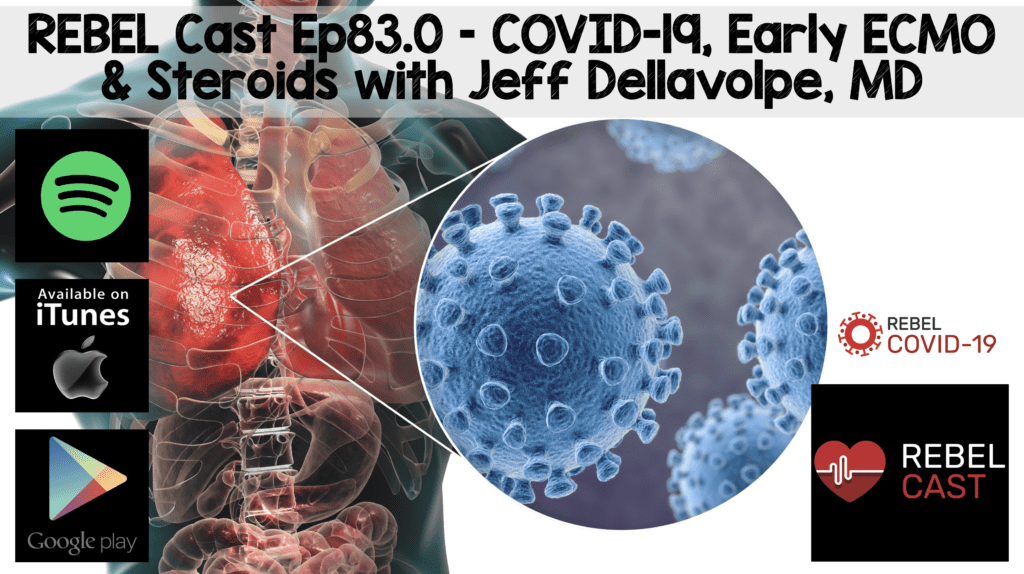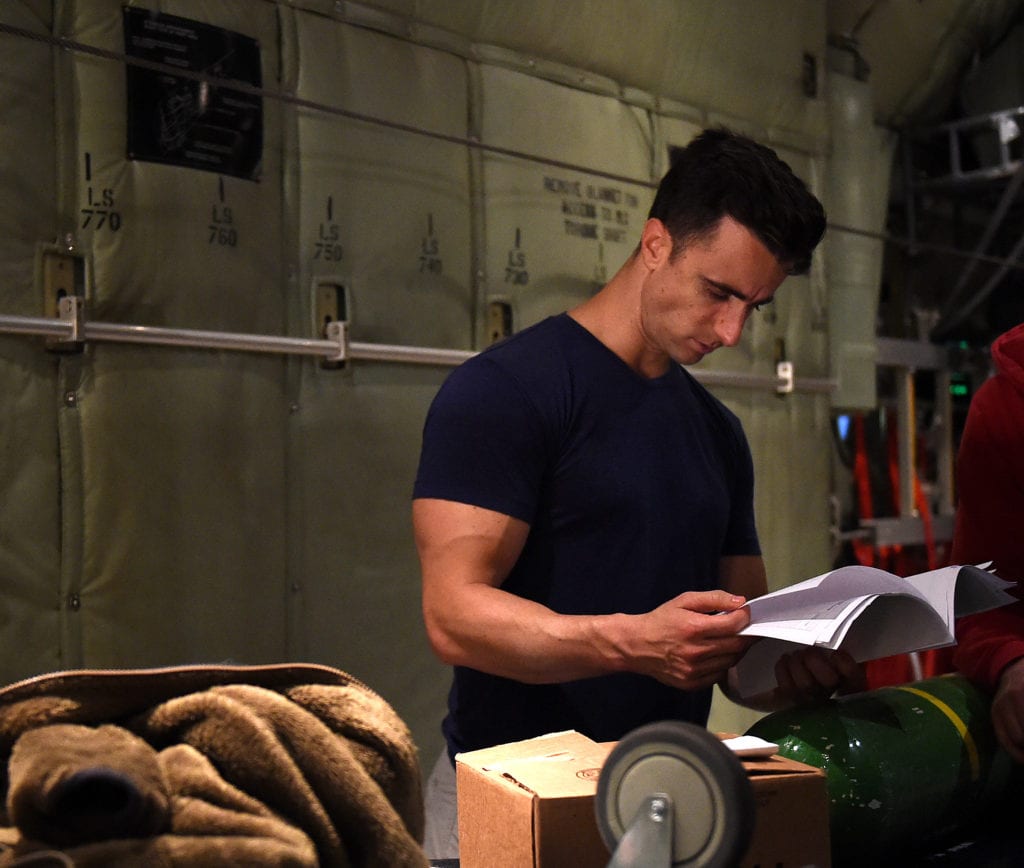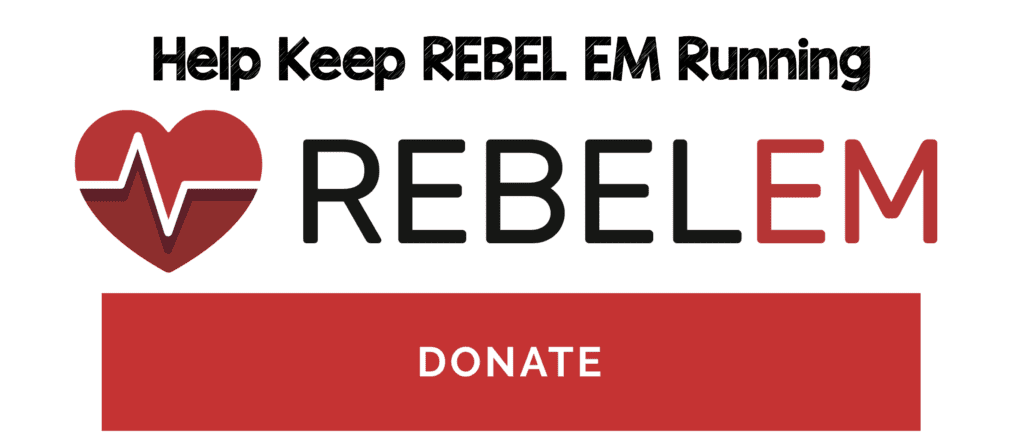
 I am fortunate to work in a hospital system that is very forward thinking. We have a phenomenal relationship with our intensivists, and I have been fortunate enough to have several discussions with them about how we are managing COVID-19 in our ICUs. For full transparency, I don’t work up in the ICU, but had the opportunity to discuss what we are doing in our ICUs with one of our intensivists (ECMO, steroids, Remdesivir, etc…). We are doing something different in San Antonio that I thought was worth discussing on this podcast that may be a feasible option for some institutions and some patients, but not all. If there is one thing this disease has taught me, that is one size does not fit all.
I am fortunate to work in a hospital system that is very forward thinking. We have a phenomenal relationship with our intensivists, and I have been fortunate enough to have several discussions with them about how we are managing COVID-19 in our ICUs. For full transparency, I don’t work up in the ICU, but had the opportunity to discuss what we are doing in our ICUs with one of our intensivists (ECMO, steroids, Remdesivir, etc…). We are doing something different in San Antonio that I thought was worth discussing on this podcast that may be a feasible option for some institutions and some patients, but not all. If there is one thing this disease has taught me, that is one size does not fit all.
REBEL Cast Episode 83 – COVID-19 in the ICU, ECMO Early, & Steroids with Jeff Dellavolpe, MD
About our Guest:

Dr. Jeffrey Dellavolpe is originally from Newport, RI. After receiving his bachelor’s degree at Dartmouth College, he went on to attend medical school at Tulane University School of Medicine. He then completed his residency in Internal Medicine at Tulane Medical Center and his fellowship in Critical Care Medicine at the University of Pittsburgh Medical Center.
Dr. Dellavolpe served as a Flight Surgeon with the 27th Special Operations Wing where he deployed twice in support of Operation Enduring Freedom – Trans Sahara. After completing his fellowship, he was assigned to the San Antonio Military Medical Center where he served as a critical care physician and a member of the 59th Medical Wing Critical Care Air Transport Team and Acute Lung Rescue Team.
Currently, Dr. Dellavolpe serves as the Medical Director of the Adult ECMO Program at Methodist Hospital, San Antonio, Texas. He is also the Medical
Director of the Cardiovascular Intensive Care Unit at Methodist Healthcare System and the Texas IPS Critical Care Service Line. He serves as chair of the Joint Society of Critical Care Medicine/Extracorporeal Life Support Organization Task Force.
Do you feel like the lower prevalence in San Antonio is reflected in your experience in the ICU?
- We were lucky enough to have time to learn from other areas and put together the resources we needed to prepare a response. I was impressed that we were able to get an entire negative-pressure ICU created in 5 days.
- Our early decision to dedicate resources to this is what lead to us now being able to respond effectively. That was also the reason we get the sickest patients preferentially sent to our hospital now.
- We noticed that a lot of the retrospective observational trials that looked at mechanically ventilated patients who were intubated early had a very high mortality rate. It was certainly concerning and allowed us to consider shifting to other strategies earlier.
- Lots of people were dying after being put on a ventilator. Was it the severity of the disease? Was there a contribution from the ventilator? We decided it was likely a combination of the two. So we knew we couldn’t go along with the standard paradigm.
So what are you doing that’s different from others?
- We are considering and initiating ECMO earlier in the course of disease
- When: Considered early; even prior to intubation for select patients
- We saw lots of problems with waiting too long in the natural progression of the disease to act. If you wait until the progression to fibrosis occurs, the utility of ECMO diminishes significantly
- Modality: All venovenous ECMO
- Clinical Selection Criteria:
- Single organ failure (AKI determined on a case by case basis)
- Minimal pressor requirement
- Young age
- Minimal comorbidities/excellent pre-illness functional status
- P:F < 100 despite 100% FiO2, proning if clinically feasible
- Why: ECMO is a bridge that provides support to patients while we treat the underlying illness. But there’s also a toxicity that it can spare patients
- For example, the toxicity that we know is associated with high dose inotropes and vasopressors in patients with cardiogenic shock. We get to avoid the perfusion issues, the acidosis, and the elevated right ventricular pressures. The best part of ECMO is that you can come down on the pressors
- And from a mechanical ventilation perspective, we also get a chance to spare patients the high FiO2
- When: Considered early; even prior to intubation for select patients
There is a lot of documented evidence for significant risk of thrombosis in COVID patients. Meanwhile, you are placing these large French catheters. Are you having any problems with clotting or bleeding? And what are you using for anticoagulation?
- From the early literature, I was certainly very nervous about thrombosis, more so than bleeding
- Changes we made in our protocol to address this:
- Increased our target PTT to 60-80 sec
- Transitioned patients to Bivalirudin (direct thrombin inhibitor)
- In response to reports of antithrombin deficiency and heparin resistance
- Increased ECMO flow rates to avoid stasis
- Added Aspirin in patients with adequate platelet counts
- We have had very few thrombotic complications
- Only had about 2-3 circuit changes
- Upon decannulation, all patients got a DVT ultrasound at the cannula site and no DVTs were found in any of our patients
- We did have a few issues with bleeding early on, so we later relaxed our PTT targets
- A few GI bleeds and some tracheal bleeds in patients who underwent tracheostomy
For our hospital system, do you know how many people have been intubated, put on ECMO or both?
- I believe it is in the upper 30s
- 18 have been initiated on ECMO
- 13 of them have also required ventilation at some point in the course
- 7 to 8 were initiated on ECMO prior to mechanical ventilation
- Note: Mechanical ventilation was part of the criteria for Remdesivir, ECMO did not qualify a patient as “sick enough”. So some patients were intubated in order to be given Remdesivir, not because ECMO was failing.
Have you observed a difference in length of treatment between ECMO and mechanical ventilation?
- Mechanical ventilation by definition will have a longer duration than ECMO
- One of the greatest perks for patients on ECMO is that their sedation is stopped, their vent is weaned down, and they are typically extubated within the next 24 hours. With the help of PT, they are standing up or walking around the hospital sooner. So the level of conditioning is also better for patients who go on ECMO.
Of the 18 patients you mentioned have been put on ECMO, how many have been discharged and how many are deceased?
- 5 are on ECMO currently
- 6 patients are deceased
- 7 have been decannulated and discharged
Recognizing that there is a huge selection bias, what have you seen in terms of mortality rates comparing ECMO and mechanical ventilation?
- Our rates seem to be very similar to those around the country, around 65-70%
The prevalence of COVID-19 is pretty low in San Antonio. What about places where there is a higher prevalence of disease? Do you think ECMO could be an option in places with such a high burden of disease?
- I think it’s important to think about this, because there’s likely to be multiple waves of this disease. We need to consider the relative capabilities of our health systems.
- It’s essential to be efficient with provisioning ECMO. We made the process as simple as possible. We simplified the circuit as much as we could so decrease the amount of resources needed.
- We trained 40 new nurses on how to take care of the ECMO machine and care for a patient on ECMO. Staffing is definitely a huge part of this effort and I am thankful to have a great team of nurses, respiratory therapists, physical therapists, environmental workers, etc.
Take-home message on ECMO:
- View ECMO as a way to spare select patients potential toxicity
- Think through what ECMO can offer your patients. It may not be an option for all systems and it may not be in-line with guidelines
- ECMO works the best when it allows for good ICU care like rehab, vent weaning and minimization of sedation. And can only happen on a system level when associated resources are minimized.
Most guidelines don’t recommend the use of steroids in the management of COVID-19. Most of this is based on extrapolation from MERS and SARS findings. But for patients coming to the ICU, you’ve been giving steroids early. Could you talk about that decision?
- It is important for us to have some healthy skepticism when we see these guidelines. We should consider what the guidelines are based on and whether or not that applies to our patient population and health system. Especially when there are these phenomena that we have to deal with at the bedside.
- We noticed a tremendous inflammatory response in our patients. We saw elevations of CRP, D-Dimer, ferritin that were met with a cytokine release syndrome cascade. It was after noticing this that we started adding steroids to the regimen.
- We don’t do this for every patient and we closely monitor biomarkers of the inflammatory response. We make these decisions daily:
- Do we need to protect the patient from the viral syndrome?
- Do we need to be able to tamp down some of this hyperinflammatory immune system?
- Do we need to just be able to mitigate the secondary effects of treatment or secondary infections?
What else are we doing in our units?
- Early on it was hydroxychloroquine and azithromycin for everyone. Those have both now fallen by the wayside.
- Due to the significant inflammatory response we looked to steroids and plasma exchange. That helped with some patients early on, but really warrants further study.
- We are currently involved in prospective IRB approved studies on the use of plasma exchange and ECMO
- We are involved in a large study using convalescent plasma
- As soon as Remdesivir became available we were interested in using it because we didn’t have any other options to decrease the viremic phase of illness
Transcript Written By: Yasien Eltigani, MS4 at St. George’s University (Twitter: @yasieneltigani)
Post Peer Reviewed By: Anand Swaminathan, MD (Twitter: @EMSwami)
The post REBEL Cast Ep83 – COVID-19 in the ICU, ECMO Early, & Steroids with Jeff Dellavolpe, MD appeared first on REBEL EM - Emergency Medicine Blog.


